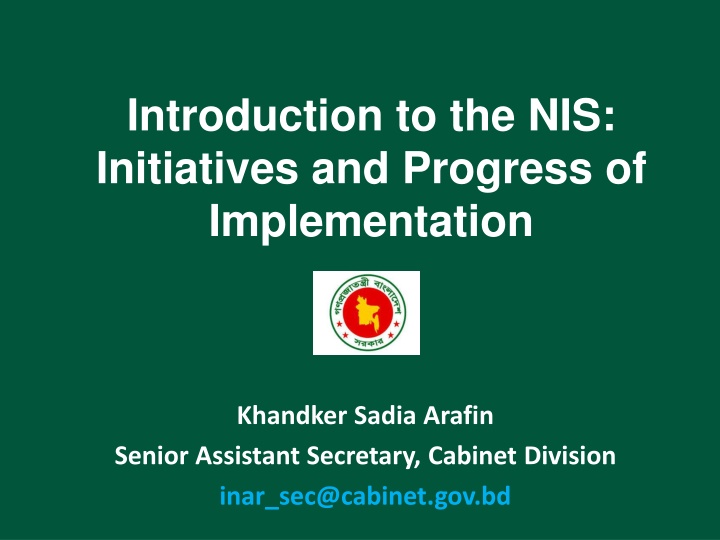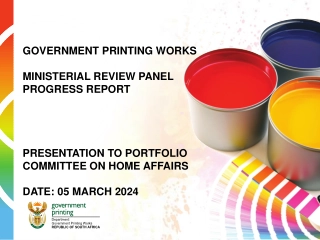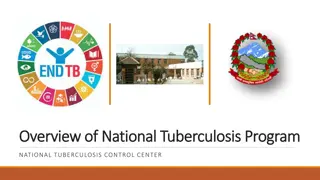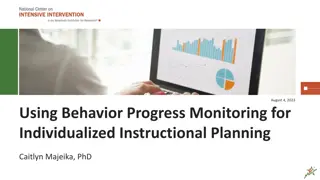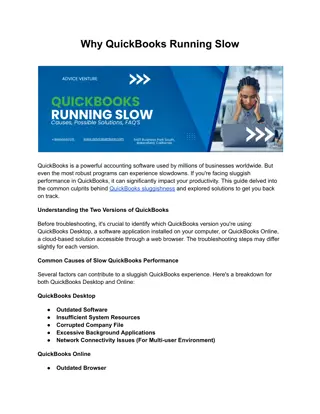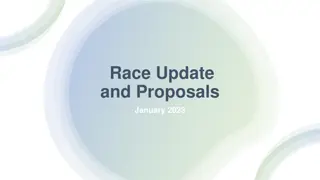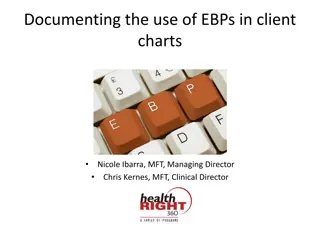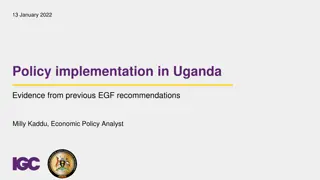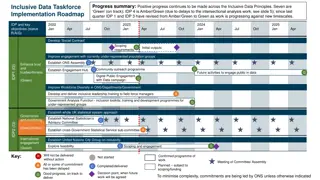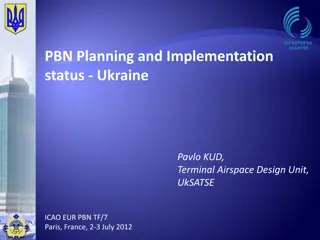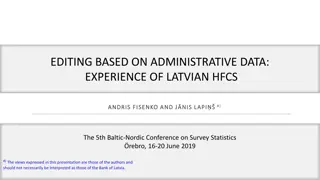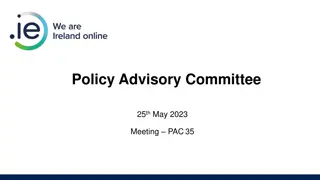Introduction to the NIS: Initiatives and Progress of Implementation
Initiatives and progress in implementing the National Integrity Strategy (NIS) focusing on promoting integrity, preventing corruption, and fostering good governance. The document explores the importance of integrity at individual and organizational levels, previous measures taken towards integrity, and the need for coordination among regulatory measures and interventions to combat corruption.
Download Presentation

Please find below an Image/Link to download the presentation.
The content on the website is provided AS IS for your information and personal use only. It may not be sold, licensed, or shared on other websites without obtaining consent from the author.If you encounter any issues during the download, it is possible that the publisher has removed the file from their server.
You are allowed to download the files provided on this website for personal or commercial use, subject to the condition that they are used lawfully. All files are the property of their respective owners.
The content on the website is provided AS IS for your information and personal use only. It may not be sold, licensed, or shared on other websites without obtaining consent from the author.
E N D
Presentation Transcript
Introduction to the NIS: Initiatives and Progress of Implementation Khandker Sadia Arafin Senior Assistant Secretary, Cabinet Division inar_sec@cabinet.gov.bd
Good Governance Prevention of Corruption Promotion of Integrity
Synonyms of integrity: honesty, probity, rectitude, ethics, morals, righteousness, morality, honor, good character, principles, virtue, decency, fairness, scrupulousness, sincerity, truthfulness, trustworthiness Integrity in this document means: behavioural excellence influenced by morality and honesty; and adherence to time-tested norms, values, customs and principles of a society;
Integrity: Individual Being duty-bound and honest; Integrity: Organizational Complying with institutional policies, systems and procedures; An organisation aims to achieve the collective goal of individuals; For promotion of integrity, strictness in observing proprieties at individual and organisational levels are critically important.
Previous Measures towards Integrity Spirit of the Constitution: a just and righteous society; Combating corruption has been a continuous effort. For example: Penal Code, 1860; Prevention of Corruption Act, 1947; Government Servant (Conduct) Rules, 1979; Government Servant (Discipline & Appeal) Rules, 1985; Reorganization of the ACC, 2004; Public Procurement Act/ Rules, 2006/2008; Right to Information Act, 2009; Whistle-blowers Protection Act, 2011; Prevention of Money Laundering Act, 2012.
Need for coordination among different regulatory measures and interventions; Development interventions of Government and NGOs have grown extensively; Corruption identified as a major concern in Government Plan documents: Sixth Five Year Plan 2011-15 Perspective Plan of Bangladesh 2010-21 UNCAC requires formulation of a Strategy to fight corruption. Rationale for Adopting NIS
Article 5. Preventive anti-corruption policies and practices 1. Each State Party shall, in accordance with the fundamental principles of its legal system, develop and implement or maintain effective, coordinated anti-corruption policies that promote the participation of society and reflect the principles of the rule of law, proper management of public affairs and public property, integrity, transparency and accountability. 2. Each State Party shall endeavour to establish and promote effective practices aimed at the prevention of corruption.
Vision, Mission of the NIS Vision: A happy and prosperous Golden Bengal Mission: Establishment of good governance in state and society
Institutions of NIS State Institutions 1. Executives and Public Administration 2. Parliament 3. Judiciary 4. Election Commission 5. Office of Attorney General 6. Public Service Commission 7. Office of Comptroller and Auditor General 8. Ombudsman 9. Anti-Corruption Commission 10. Local Government
Institutions of NIS Non-State Institutions 1. Political parties 2. Private sector 3. NGO / Civil Society 4. Educational Institutions 5. Media 6. Family
Strategy for Attaining Integrity This strategy paper Identifies the contexts and challenges faced by different state and non-state institutions; Sets goals of the institutions to ensure integrity; Makes short, medium & log-term recommendations for achieving the goals; Suggests time-bound action plan for implementation of these recommendations Short term - 1 year, medium term - 3 years, long term - 5 years.
Executive Organs and Public Administration Goal: Establishment of a transparent executive organ of the State, which is responsive to the demands and needs of people.
Executive Organs and Public Administration Challenges: Promulgation of a Civil Service Act; Increasing functional freedom of public services with accountability; Enhancing efficiency and effectiveness; Establishing links between promotion, transfer, pay and emoluments with appraised performance; Introduction of a competitive pay and incentive structure; Overall reform by ensuring equitable opportunities for different cadre services; Building citizen-friendly enforcement agencies; Fair, neutral and visible decision-making.
Executive Organs and Public Administration Short Short- -term Making systemic arrangements for submission of asset statements; Proper enforcement of Whistle Blowers Protection Act; Dealing with grievances by operationalising the Grievance Redress System ; Introduction of modern performance appraisal, incentive and emolument systems; Ensuring appointment of government officers and employees on a regular basis. term Recommendations Recommendations
Executive Organs and Public Administration Medium and Long term Medium and Long term Recommendations Enactment of Civil Service Act; Establishment of an efficient, accountable, qualified and responsive executive organ by ensuring career development ; Providing in-service training for developing capacity; Introduction of a competitive promotion system based on a combination of seniority, merit, efficiency and performance; Expansion of e-governance system; Framing a just pay-structure for the public servants with provisions for adjustments with cost of living. Recommendations
Executive Organs and Public Administration Sl. Interventions Performance Indicator Civil Service enacted Time-frame Responsibility Supported by 1. Enactment of Civil Service Act law Medium term Ministry Public Administration of Legislative Parliamentary Affairs Division and 2 Formulation Career Plan of Career formulated; transparency established fairness ensured in promotion Newly formulated system followed Plan Medium term Ministry Public Administration of Cabinet Division and 3. Introduction participatory appraisal system Regular submission of income and asset statements specified authorities Better pay facilities officers employees of Short term Ministry Public Administration Ministry Public Administration of All Ministries/ Divisions All Ministries/ Divisions other 4. Statements submitted regular basis Short term of other on a to 5. and for and Establishment permanent and Commission of Long term Finance Division Cabinet Division Pay Service
Executive Organs and Public Administration 6. Establishment for introduction of e- governance of ICT a) ICT introduced and used in all Min/Div; (b) volume and quality of services increased and improved by ICT use Each public office has a GRS focal point and is publicly known Min/Div divided clusters, gazette notified Whistle (Protection) enforced Law published official Gazette Short term Ministry Information Communication Technology of Cabinet Division and 7. Introduction Complaint Management of Short term Cabinet Division All Ministries/ Divisions Cabinet Div; All Min/Div Cabinet Division other Clustering Ministries/ Divisions Enactment of Whistle Blowers Act 10. Establishment separate investigation 11. Modernisation of land management implementation Land Use Plan 12. Strict handling marketing adulterated medicine and goods 8. of in Long term Impleme nted Ministry of Administration Legislative Parliamentary Affairs Division Ministry Affairs Public 9. and Blowers Act, 2011; (Protection) of for in the Short term of Home Legislative and Parliamentary Affairs Division Ministry Public Administration agency Digitised management established land Medium term Ministry of Land of and of system of of Adulteration enforced Act Short term/ continuo usly BSTI, Industries Ministry of Ministry Home Affairs of food,
Implementation Arrangement Arrangement in Section Four: Brief and flexible arrangement Self initiative considering high importance of integrity Coordinated by the executive Approach: 1. Development of administrative system and process 2. Development skills of officials 3. Regulatory and administrative reforms 4. Monitoring and evaluation 5. Award for the best practitioners
Implementation Arrangement (cont.) Institutional Arrangements 1. Central Level: National Integrity Advisory Council; Executive Committee of the Council; National Integrity Implementation Unit (NIIU Cabinet Division); 2. Ministry Level: Ethics Committee at every Ministry/Division and Institutions; Focal Point for every Ethics Committee; 3. NGO and Private Sector: NOGAB and M/O Commerce (Preparation of Guideline)
Ethics Committee Headed by the Secretary in Ministry/Division Head / 2ndman in NIS Institutions; Heads of extension departments members; Member Secretary is the focal point ; ToR for Ethics Committee: Identification of challenges of promotion of integrity and good governance; Prepare time-bound work-plan to overcome challenges; Fixing responsibilities for implementation of the work-plan; Monitoring implementation of work-plan; Reporting to the NIIU on progress
Standard Operating Procedure (SOP) Stakeholders meeting Identify governance challenges Prepare individual work-plan RTI>GRS>E- governance>skills Include new activities Revise work-plan Share experiences Action Plan Check DO Distribute responsibilities Provide necessary budget Implement plan/activities Conduct regular Ethics Committee meeting Monitor and evaluate implementation
NIS Work-plan: Monitoring Framework - / (Baseline) ( - / ) / - / / - / / - / / - /
Progress of NIS Implementation Dissemination of the NIS Ethics Committees are functioning Ministries/Divisions prepared work-plans Focus on RTI, E-governance, GRS increased Training and capacity development initiatives increased Annual Performance Management System introduced Sub-committee formed in priority areas NIS Support Project started with technical assistance from JICA
Potentials of the NIS Constitutional responsibility of the state to promote good governance Most of the contemporary issues that affect governance are included Reformative, not revolutionary Reflection of a positive intention of the Government Bringing the good governance agenda in the front Increasing demand for good governance
Way Forward Involving citizens and stakeholders Effective coordination among institutions for synergy Focused activities within the watch-dog institutions Promoting good practices Prioritizing service delivery
Possible initiatives of the Ministries Integrity as a thought-provoking and critical issue of governance among officials Involve officials in creative activities on integrity and governance (exercise, souvenir, cultural and literary activities etc.) Introduce successful initiatives and legendary personalities on integrity and honesty Encourage leadership development, self- initiatives and innovation for good governance Feedback and recommendations to NIIU
